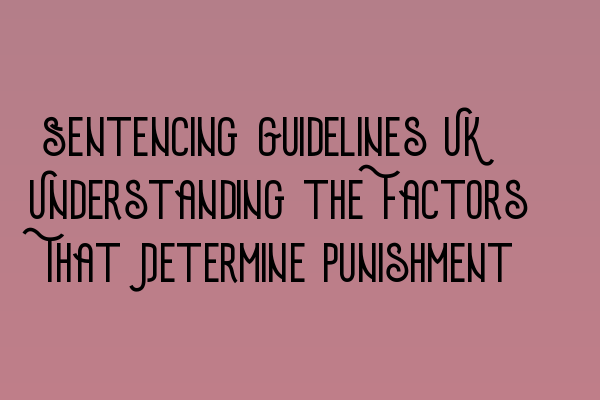Sentencing Guidelines UK: Understanding the Factors That Determine Punishment
One of the most critical aspects of the criminal justice system in the UK is the determination of appropriate punishment for individuals convicted of crimes. Sentencing guidelines play a crucial role in ensuring that punishments are fair, proportionate, and consistent.
The Purpose of Sentencing Guidelines
Sentencing guidelines are legal documents that provide guidance to judges and magistrates when determining the appropriate punishment for a convicted offender. These guidelines assist in promoting consistency, transparency, and predictability in sentencing decisions, ensuring fairness and justice in the criminal justice system.
Understanding and interpreting sentencing guidelines is crucial for both legal professionals and individuals facing criminal charges. By grasping the factors that determine punishment, you can better navigate the complexities of the criminal justice system and make more informed decisions.
Key Factors in Determining Punishment
When determining an appropriate sentence, judges and magistrates consider various factors outlined in the sentencing guidelines. These factors include:
- The nature and seriousness of the offence
- The impact on the victim(s) or community
- The offender’s level of culpability
- The offender’s previous convictions or record
- The offender’s personal circumstances
- The need to protect the public
- The need to rehabilitate the offender
- The specific aims of punishment and sentencing
By carefully evaluating these factors, judges and magistrates can determine an appropriate sentence that considers the specific circumstances of the case and the offender’s individual characteristics.
How Sentencing Guidelines are Applied
Sentencing guidelines are not rigid rules, but rather provide a framework within which judges and magistrates exercise their discretion. The guidelines offer ranges or brackets of sentences based on various factors and aggravating or mitigating circumstances.
It is crucial to note that each case is unique, and sentencing decisions are made on a case-by-case basis. This allows for flexibility and the consideration of exceptional circumstances that may warrant a departure from the suggested sentence brackets.
Furthermore, sentencing guidelines are continually reviewed and updated to reflect changes in legislation, societal attitudes, and evolving legal principles. Staying informed about these updates is essential for legal professionals to provide accurate advice to their clients.
Conclusion
Understanding the factors that determine punishment in the UK’s criminal justice system is essential for legal professionals and individuals involved in criminal proceedings. Sentencing guidelines provide the necessary framework for judges and magistrates to make fair and consistent sentencing decisions.
For those preparing to embark on a legal career, it is crucial to familiarize yourself with sentencing guidelines and continue expanding your knowledge through resources such as practice exam questions and preparation courses, such as SQE 1 Practice Exam Questions and SQE 1 Practice Mocks FLK1 FLK2. Additionally, for those preparing for the SQE 2, SQE 2 Preparation Courses and SQE 1 Preparation Courses can provide invaluable guidance.
Stay updated with the latest SRA SQE Exam Dates to ensure you are on track with your legal career aspirations.
